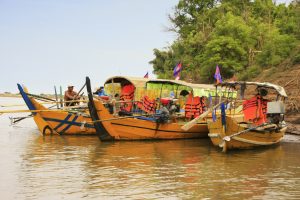Cambodia’s prime minister has stated that the country will not develop any hydropower dams on the Mekong River, reaffirming a moratorium on mainstream dam projects announced in 2020.
Speaking at the ground-breaking ceremony for the construction of a 150-megawatt hydropower dam in the southern province of Koh Kong, Prime Minister Hun Manet said that constructing dams on the mainstream of the Mekong would have “a huge impact” on the river’s ecology.
“The 7th-mandate Royal Government will not build dams on the Mekong River, no matter what the benefits are,” he said, according to a report on the website of the Cambodian People’s Party.
He said that hydropower development might also have deleterious impacts on the Tonle Sap Lake, Southeast Asia’s largest freshwater lake and a crucially important source of protein for the Cambodian population.
Manet also announced the official cancellation of the $1.5 billion, 700-megawatt coal plant in the protected Botum Sakor National Park in Koh Kong, which is due to come online in 2025. As per the news agency AFP, Hun Manet stated that Cambodia would not develop new coal power plants as part of the country’s “responsibility for the world’s shared environment and climate.”
During his speech, Hun Manet said that renewable energy, mostly from hydropower, currently accounts for 60 percent of the country’s energy mix. The government aimed to push this up to 70 percent by the end of the decade, he added, “so that our country becomes the clean energy destination for tourism and investment.”
The Cambodian leader said that the move was a message to countries at COP28 climate talks in Dubai, according to AFP. Under its Long-term Strategy for Carbon Neutrality, released in December 2021, Phnom Penh has committed to achieving net-zero carbon emissions by 2050. This will involve the reduction of expansion of renewable energy and investments in liquid natural gas, which will be used as “a transition fuel in the power sector.” Coal generated 35.5 percent of Cambodia’s electricity in 2022, according to Électricité du Cambodge, while hydropower accounted for nearly 54 percent.
Manet’s announcement about Mekong dams is not particularly surprising. In March 2020, after several seasons of unusually harsh droughts that saw water levels along Southeast Asia’s great river fall to record lows, Cambodia’s government announced a 10-year moratorium on Mekong dam developments, a pledge that was later repeated by the Ministry of Environment. A government official said at the time that the decision to halt Mekong dam developments had been made after a Japanese consultant recommended that Cambodia invest in alternative forms of energy.
At the time, the government had two hydropower megaprojects slated for the mainstream of the great river: the Stung Treng dam in the northern province of the same name, and the Sambor project to the south in Kratie province.
Both have been harshly criticized by environmental activists, who claim that mainstream hydropower dam developments, particularly in China, have had a sharp negative impact on the Mekong, which runs for 4,350 kilometers from the icy plateau of Tibet to the South China Sea.
According to the U.S.-government Mekong Dam Monitor (MDM), 2020 was the driest year on record along the lower Mekong, while environmentalists and riverside communities have observed an increasingly erratic pattern of rises and falls in water levels. “Data shows that dams have exacerbated wet season droughts and, in some places, have inexorably altered the natural flow patterns of Southeast Asia’s most productive river,” the MDM stated in a report released last year.
There are currently 11 operational dams on the river’s upper reaches in China, in addition to two in Laos, which has long-standing ambitions to transform itself into the “battery of Southeast Asia.” The Lao government has seven more dams planned for the Mekong, several of which are in the early stages of planning and construction.
Despite the Cambodian government’s moratorium on Mekong dam projects, activists and environmentalists have been wary that it might not last, with reports last year that the government was considering reviving the Stung Treng dam project.
Manet’s comments at least suggest that the resurrection of either of these two mega-dams is unlikely for the foreseeable future. However, the fact that he made the announcement at the groundbreaking for a dam project in the same speech that he announced a step away from coal, suggests that hydropower will continue to play a prominent role in Cambodia’s march toward net-zero.

































